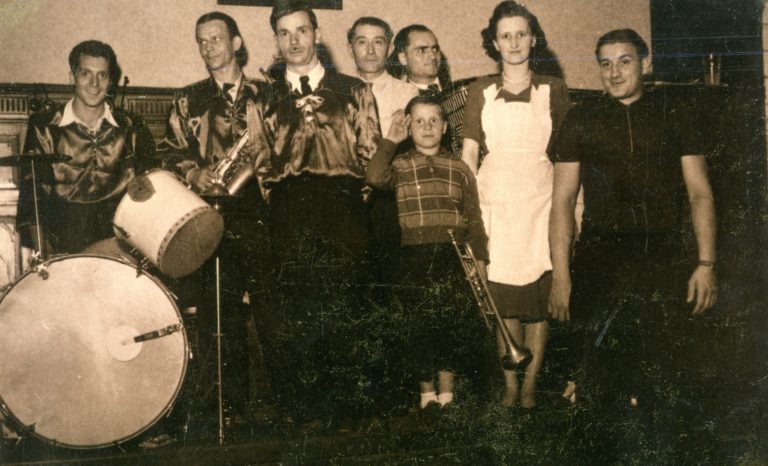Image: Private archives, François Mallia, 1950.
Tuesday 3 March 2026, 4.00-6.00pm (GMT)
This is an online event. Register for the Zoom here:
https://us02web.zoom.us/webinar/register/WN_AiqkX33rTBSsjY5haWh4PA#/registration
‘Amateur’ musicians?
Steel workers crafting free time in the Luxembourgish mining basin
Speaker:
Laura Steil, cultural anthropologist, Paris and Luxembourg
Invited Discussant:
Jonathan Skinner, anthropologist and dancer, University of Surrey
Abstract:
Studying Luxembourgish mine and factory workers’ travail à-côté (Weber, 1989) as ballroom musicians (danzmuseker) offers rich insights into the articulation between “free time”, industrial hierarchies, and social aspirations. Developing from the mid-nineteenth century onwards, the steel industry of the Greater Region (in Luxembourg) gave birth to unique working-class neighbourhoods reknowned for their talented musicians and festive venues, often located near the entrances to industrial sites. Drawing on ethnography, interviews, archives and reenactment, the three-year Dancing Esch project, carried out at the University of Luxembourg (FNR-DFG), studied workers’ festivities in Esch-sur-Alzette, 1920–1980. In this talk, I will examine how the “work beyond work” worker-musicians opened a potential space between the “real” and the “possible” (Fouquet 2017), allowing creative interactions with their material, social and cultural environments. I will explore what it meant to “work” in two worlds at once that were layered, interdependent and antagonistic, and how being “an amateur” truly meant loving and living by music.
Biographical note:
Laura Steil holds a PhD in cultural anthropology from the Ecole Pratique des Hautes Etudes, Paris (2015). Her research focuses on social dance milieus in contemporary Europe: the afro and hip-hop scenes in the Paris region and twentieth-century dancehalls in the Luxembourg mining basin. She has investigated dance parties, videoclip shootings or social media publications, playfully experimenting with the tools of ethnography, historiography and participatory research. She is particularly interested in learning, transmission and (re)mediations, as well as in cultural memory. She looks at contexts in which social or spatial ruptures, such as those induced by migration, have complexified modes of intergenerational transmission and community remembrance. Laura teaches research methods in various professional dance degrees and advocates for popular dance research within the international research group Pop Moves. She also remains active in the non-profit and cultural sector in Luxembourg and France and is involved in artistic and cultural education (EAC) and public history initiatives.
Dr Jonathan Skinner is Reader in the Anthropology of Events at the University of Surrey. He has a particular teaching interest in interviewing skills and qualitative research methods. He has undertaken fieldwork in the Eastern Caribbean on the island of Montserrat (carnival and festival tourism and trauma, colonial relations and disaster recovery) and in the US/UK (social dancing, arts health, contested heritage and St Patrick’s Day). He recently applied his work on festivals and carnival to support sustainable lobster fishing practices in Sainte Luce, Madagascar (2019).
He co-edits the award-winning book series ‘Dance and Performance Studies’ for Berghahn Publishers with Professor Helena Wulff (University of Stockholm). He is also two-times Ulster Salsa Champion (2008, 2011) and a qualified Argentine tango instructor.
Dr Jonathan Skinner | University of Surrey
_____________________________________________
Artistry@Work is an online Seminar Series in the Anthropology of Artists & Artisans, running 2024–2026
Maison des Sciences de l’Homme–Université Clermont Auvergne, in collaboration with the Royal Anthropological Institute
Organisers: Dr Raphaël Blanchier & Professor Trevor Marchand
This seminar series in anthropology explores the situated practices of ‘artistry at work’ and, more broadly, the working lives and career trajectories of artists and artisans plying their trades in regions around the globe. The scope of the series also encompasses studies of occupations not conventionally categorised as “artistic” but that nevertheless foster creativity among (some) practitioners and even accommodate the development of “artist” identities.
Find all events in the series here: https://therai.org.uk/series/artistrywork/


